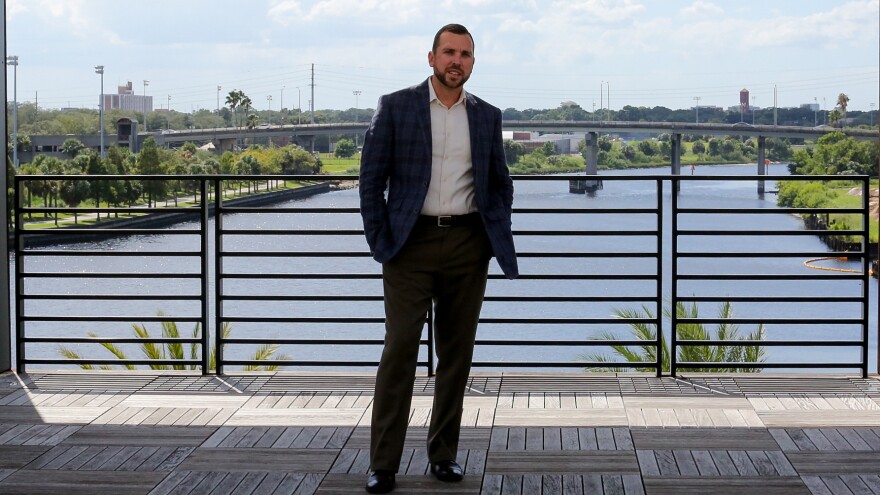It's a headline you can write every election year:
FLORIDA THE BIG BATTLEGROUND IN THIS YEARS' RACE TO THE WHITE HOUSE
But that banner belies significant changes taking place in rapid fashion.
In fact, if your image of Florida politics is senior citizens peppering candidates with questions about Social Security and Medicare, it's time for an update. Or a new headline.
Perhaps something like this:
MILLENNIALS A RISING FORCE IN FLORIDA ELECTIONS
Senior citizens – now mostly Baby Boomers – are still a large section of voters in the state. And it remains a popular retirement community for so-called snow birds from up north.
But the census bureau figures show that the number of Floridians aged 18-34 now outnumber those over age 65. And those millennials are far more diverse and more liberal – especially on social issues – than their older counterparts. They also have very different expectations from government and from other institutions, including the media.
But if millennials are indeed going to wield clout equal to their growing numbers, they are going to have to get out and vote.
Their participation in this year's Florida primary was up but still lags behind overall turnout rates statewide.
It's fair to say that the 2016 election is NOT something people are feeling inspired by. Certainly, that's true of young voters as well, with the added frustration that many of the issues they feel so strongly about aren't a major part of the discussion by the major party candidates.
A group of seven young professionals from the Tampa area gathered to talk about the campaign on a recent weekday at a downtown restaurant. They varied in political ideology — but their shared thoughts about this election revealed disgust with the process, but also fascination.
"It's been very entertaining. Like a reality TV show almost," said Chris Chambers, a 33-year-old military veteran and Tampa power company employee.
On one hand, 26-year-old Tampa attorney Rebecca Arends says "I think it's fantastic that everyone is so passionate about it," but on the other hand she quickly adds "This has been a pretty dirty campaign, it's been a circus, and that's what worries me going forward."
Arends is an independent who supports Clinton, though she acknowledges that the once enthusiastic backing for the Democratic nominee is waning as the campaign wears on. Chambers, meanwhile, is a Republican who says he's undecided. But as an African-American, he adds that he's not a Trump fan, in part because of how Trump talks about race. He describes his own politics as, "Republican. Not far right, in between."

Dave Loos, 34, works in contract furniture sales in Tampa and is a Donald Trump fan. Earlier in the year, he supported Florida Sen. Marco Rubio. He says he likes the strength Trump projects, but still gets frustrated at the tone of the campaign, saying at times the debate sounds like "little children."
Rachel Canipe, 25, listens to all of this from the end of the lunch table. She works in digital media and is a Clinton supporter, but says of the options this election, "it's just an unfortunate selection that we have."
Amplifying such millennial dissatisfaction is the fact that Hillary Clinton and Trump — age wise — are a throwback to the baby boom after the relative youthfulness of President Obama.
Canipe adds, "I am not satisfied that either of them really know what it's like to be a millennial or what we care about or value."
She cites what she calls "educational inflation" — the idea that you need a college degree even for jobs that in the past wouldn't have required one. And for so many millennials, what comes along with that is "crippling student debt," according to Canipe.
One thing that really irks these young professionals who are eager to get ahead and are active in clubs and networking groups to help them do so – it's that frequent portrayal of millennials as pessimists who are detached from politics and other kinds of community involvement.
"Everyone says millennials are apathetic," said 29-year-old Megan Wade of Tampa. That's not true, she counters. "I think people are getting more engaged." Still, she does say that her generation is more realistic than those before it "when it comes to our expectations of government and what government going to do for us, versus what we need to do and take personal responsibility on." Wade does community outreach for a volunteer organization and is a Democrat who supported Vermont Sen. Bernie Sanders before switching to Clinton after the primaries.
Despite the different ideologies represented around the lunch table – three Democrats, two Republicans, and Independent and a Libertarian – there was a consensus around Wade's skepticism about the effectiveness of government.
For 26-year-old Zach Lombardo, an attorney who says he's voting for Libertarian Gary Johnson for president, there's another new reality. Just about everyone around this table grumbled about the tone of the campaign on social media. But, Lombardo said, "get used to it".
"It's like 24-hour news coverage plus one," he says. Adding that it shouldn't surprise anyone. "This is just what an election looks like."
Meaning what we're seeing in 2016 is just the beginning – and is likely a preview of elections to come.
Copyright 2023 NPR. To see more, visit https://www.npr.org.



